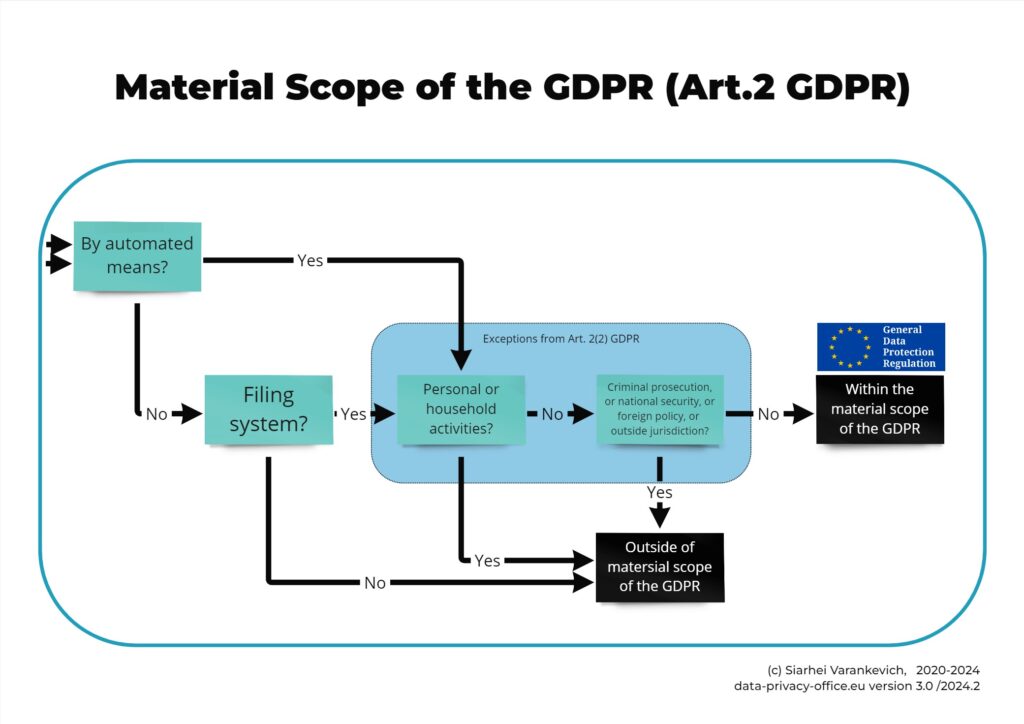(14) Šajā regulā noteiktajai aizsardzībai attiecībā uz personas datu apstrādi būtu jāattiecas uz fiziskām personām neatkarīgi no to valstspiederības vai dzīvesvietas. Šī regula neattiecas uz tādu personas datu apstrādi, kas skar juridiskas personas un jo īpaši uzņēmumus, kuriem ir juridiskas personas statuss, tostarp juridiskās personas nosaukumu, uzņēmējdarbības formu un kontaktinformāciju.
(14) The protection afforded by this Regulation should apply to natural persons, whatever their nationality or place of residence, in relation to the processing of their personal data. This Regulation does not cover the processing of personal data which concerns legal persons and in particular undertakings established as legal persons, including the name and the form of the legal person and the contact details of the legal person.
(15) Lai izvairītos no likuma apiešanas nopietna riska radīšanas, fizisku personu aizsardzībai vajadzētu būt tehnoloģiski neitrālai un tai nevajadzētu būt atkarīgai no izmantotajiem paņēmieniem. Fizisku personu aizsardzībai būtu jāattiecas gan uz personas datu apstrādi ar automatizētiem līdzekļiem, gan uz datu manuālu apstrādi, ja personas dati ir ietverti vai tos paredzēts ietvert kartotēkā. Šīs regulas darbības jomai nebūtu jāaptver datnes vai datņu kopumi, kā arī to ievadlapas, kuras nav sakārtotas atbilstoši konkrētiem kritērijiem.
(15) In order to prevent creating a serious risk of circumvention, the protection of natural persons should be technologically neutral and should not depend on the techniques used. The protection of natural persons should apply to the processing of personal data by automated means, as well as to manual processing, if the personal data are contained or are intended to be contained in a filing system. Files or sets of files, as well as their cover pages, which are not structured according to specific criteria should not fall within the scope of this Regulation.
(16) Šo regulu nepiemēro jautājumiem par pamattiesību un pamatbrīvību aizsardzību vai tādu personas datu brīvu apriti, kas saistīti ar darbībām, kuras neietilpst Savienības tiesību darbības jomā, piemēram, darbībām attiecībā uz valsts drošību. Šo regulu nepiemēro personas datu apstrādei, ko veic dalībvalstis, rīkojoties saistībā ar Savienības kopējo ārpolitiku un drošības politiku.
(16) This Regulation does not apply to issues of protection of fundamental rights and freedoms or the free flow of personal data related to activities which fall outside the scope of Union law, such as activities concerning national security. This Regulation does not apply to the processing of personal data by the Member States when carrying out activities in relation to the common foreign and security policy of the Union.
(17) Eiropas Parlamenta un Padomes Regulu (EK) Nr. 45/2001 [6] piemēro personas datu apstrādei Savienības iestādēs, struktūrās, birojos un aģentūrās. Regula (EK) Nr. 45/2001 un citi Savienības tiesību akti, ko piemēro šādai personas datu apstrādei, būtu jāpielāgo principiem un noteikumiem, kas noteikti šajā regulā, un jāpiemēro saskaņā ar šo regulu. Lai nodrošinātu stingru un saskaņotu regulējumu datu aizsardzībai Savienībā, pēc šīs regulas pieņemšanas būtu jāveic vajadzīgie pielāgojumi Regulā (EK) Nr. 45/2001, lai tos varētu piemērot vienlaikus ar šo regulu.
(17) Regulation (EC) No 45/2001 of the European Parliament and of the Council [6] applies to the processing of personal data by the Union institutions, bodies, offices and agencies. Regulation (EC) No 45/2001 and other Union legal acts applicable to such processing of personal data should be adapted to the principles and rules established in this Regulation and applied in the light of this Regulation. In order to provide a strong and coherent data protection framework in the Union, the necessary adaptations of Regulation (EC) No 45/2001 should follow after the adoption of this Regulation, in order to allow application at the same time as this Regulation.
[6] Regulation (EC) No 45/2001 of the European Parliament and of the Council of 18 December 2000 on the protection of individuals with regard to the processing of personal data by the Community institutions and bodies and on the free movement of such data (OJ L 8, 12.1.2001, p. 1). https://eur-lex.europa.eu/legal-content/EN/AUTO/?uri=OJ:L:2001:008:TOC
(18) Šo regulu nepiemēro personas datu apstrādei, kuru veic fiziska persona tikai personiska vai mājsaimnieciska pasākuma gaitā un kura tādējādi nav saistīta ar profesionālu vai komerciālu darbību. Personiski vai mājsaimnieciski pasākumi varētu ietvert korespondenci un adrešu sarakstu turēšanu, vai sociālo tīklošanos un tiešsaistes darbības, ko veic saistībā ar šādiem pasākumiem. Tomēr šo regulu piemēro pārziņiem vai apstrādātājiem, kas nodrošina personas datu apstrādes līdzekļus šādām personiska vai mājsaimnieciska rakstura darbībām.
(18) This Regulation does not apply to the processing of personal data by a natural person in the course of a purely personal or household activity and thus with no connection to a professional or commercial activity. Personal or household activities could include correspondence and the holding of addresses, or social networking and online activity undertaken within the context of such activities. However, this Regulation applies to controllers or processors which provide the means for processing personal data for such personal or household activities.
(19) Fizisku personu aizsardzība attiecībā uz personas datu apstrādi, ko veic kompetentas iestādes, lai novērstu, izmeklētu, atklātu noziedzīgus nodarījumus vai lai sauktu pie atbildības par tiem, vai lai izpildītu kriminālsodus, tostarp pasargātu no draudiem sabiedriskajai drošībai un tos novērstu, un šādu datu brīva aprite ir konkrēta Savienības tiesību akta priekšmets. Tāpēc šī regula nebūtu jāpiemēro apstrādes darbībām, kas veiktas minētajos nolūkos. Tomēr personas datu apstrāde, ko minētajos nolūkos saskaņā ar šo regulu veic publiskas iestādes, būtu jāreglamentē konkrētākā Savienības tiesību aktā, proti, Eiropas Parlamenta un Padomes Direktīvā (ES) 2016/680 [7]. Dalībvalstis kompetentajām iestādēm Direktīvas (ES) 2016/680 nozīmē var uzticēt uzdevumus, kas nav obligāti saistīti ar darbībām, ko veic nolūkā novērst, izmeklēt, atklāt noziedzīgus nodarījumus vai saukt pie atbildības par tiem vai nolūkā izpildīt kriminālsodus, tostarp pasargāt no draudiem sabiedriskajai drošībai un tos novērst, tādējādi šajos citos nolūkos veiktā personas datu apstrāde, ciktāl tā ietilpst Savienības tiesību aktu darbības jomā,
(19) The protection of natural persons with regard to the processing of personal data by competent authorities for the purposes of the prevention, investigation, detection or prosecution of criminal offences or the execution of criminal penalties, including the safeguarding against and the prevention of threats to public security and the free movement of such data, is the subject of a specific Union legal act. This Regulation should not, therefore, apply to processing activities for those purposes. However, personal data processed by public authorities under this Regulation should, when used for those purposes, be governed by a more specific Union legal act, namely Directive (EU) 2016/680 of the European Parliament and of the Council [7]. Member States may entrust competent authorities within the meaning of Directive (EU) 2016/680 with tasks which are not necessarily carried out for the purposes of the prevention, investigation, detection or prosecution of criminal offences or the execution of criminal penalties, including the safeguarding against and prevention of threats to public security, so that the processing of personal data for those other purposes, in so far as it is within the scope of Union law, falls within the scope of this Regulation.
ietilpst šīs regulas darbības jomā. Attiecībā uz personas datu apstrādi, ko minētās kompetentās iestādes veic nolūkos, kas ir šīs regulas darbības jomā, dalībvalstīm būtu jāspēj uzturēt spēkā vai ieviest konkrētākus noteikumus, lai pielāgotu šīs regulas noteikumu piemērošanu. Šādos noteikumos var vēl precīzāk noteikt konkrētas prasības personas datu apstrādei, ko minētās kompetentās iestādes veic šajos citos nolūkos, ņemot vērā attiecīgās dalībvalsts konstitucionālo, organizatorisko un administratīvo struktūru. Ja personas datu apstrāde, ko veic privātas struktūras, ietilpst šīs regulas darbības jomā, šajā regulā būtu jāparedz dalībvalstīm iespēja īpašos gadījumos ar likumu ierobežot konkrētus pienākumus un tiesības, ja šāda ierobežošana demokrātiskā sabiedrībā ir nepieciešams un samērīgs pasākums, lai garantētu konkrētu svarīgu interešu aizsardzību, tostarp sabiedrisko drošību un noziedzīgu nodarījumu novēršanu, izmeklēšanu, atklāšanu vai saukšanu pie atbildības par tiem, vai kriminālsodu izpildi, tostarp pasargāšanu no draudiem sabiedriskajai drošībai un to novēršanu. Tas ir svarīgi, piemēram, saistībā ar nelikumīgi iegūto līdzekļu legalizēšanas apkarošanu vai kriminālistikas laboratoriju darbībām.
With regard to the processing of personal data by those competent authorities for purposes falling within scope of this Regulation, Member States should be able to maintain or introduce more specific provisions to adapt the application of the rules of this Regulation. Such provisions may determine more precisely specific requirements for the processing of personal data by those competent authorities for those other purposes, taking into account the constitutional, organisational and administrative structure of the respective Member State. When the processing of personal data by private bodies falls within the scope of this Regulation, this Regulation should provide for the possibility for Member States under specific conditions to restrict by law certain obligations and rights when such a restriction constitutes a necessary and proportionate measure in a democratic society to safeguard specific important interests including public security and the prevention, investigation, detection or prosecution of criminal offences or the execution of criminal penalties, including the safeguarding against and the prevention of threats to public security. This is relevant for instance in the framework of anti-money laundering or the activities of forensic laboratories.
[7] Eiropas Parlamenta un Padomes Direktīva (ES) 2016/680 (2016. gada 27. aprīlis) par fizisku personu aizsardzību attiecībā uz personas datu apstrādi, ko veic kompetentās iestādes, lai novērstu, izmeklētu, atklātu noziedzīgus nodarījumus vai sauktu pie atbildības par tiem vai izpildītu kriminālsodus, un par šādu datu brīvu apriti, ar ko atceļ Padomes Pamatlēmumu 2008/977/TI (skatīt šā Oficiālā Vēstneša 89. lpp.).
[7] Directive (EU) 2016/680 of the European Parliament and of the Council of 27 April 2016 on the protection of natural persons with regard to the processing of personal data by competent authorities for the purposes of prevention, investigation, detection or prosecution of criminal offences or the execution of criminal penalties, and the free movement of such data and repealing Council Framework Decision 2008/977/JHA (see page 89 of this Official Journal).
(20) Kaut arī šī regula cita starpā ir piemērojama tiesu un citu tiesu iestāžu darbībai, Savienības vai dalībvalstu tiesību aktos varētu precizēt apstrādes darbības un apstrādes procedūras attiecībā uz personas datu apstrādi, ko veic tiesas un citas tiesu iestādes. Ja tiesa personas datus apstrādā, veicot tiesas spriešanas funkciju, šāda apstrāde nebūtu jāiekļauj uzraudzības iestādes kompetencē, lai nodrošinātu, ka tiesu iestādes ir neatkarīgas savu tiesu varas uzdevumu izpildē, tostarp lēmumu pieņemšanā. Šādu datu apstrādes darbību uzraudzību vajadzētu būt iespējai uzticēt attiecīgās dalībvalsts tiesu sistēmas konkrētām struktūrām, kurām jo īpaši būtu jānodrošina atbilstība šīs regulas noteikumiem, jāveicina tiesu iestāžu darbinieku informētība par to pienākumiem, kas ietverti šajā regulā, un jāizskata sūdzības par šādām datu apstrādes darbībām.
(20) While this Regulation applies, inter alia, to the activities of courts and other judicial authorities, Union or Member State law could specify the processing operations and processing procedures in relation to the processing of personal data by courts and other judicial authorities. The competence of the supervisory authorities should not cover the processing of personal data when courts are acting in their judicial capacity, in order to safeguard the independence of the judiciary in the performance of its judicial tasks, including decision-making. It should be possible to entrust supervision of such data processing operations to specific bodies within the judicial system of the Member State, which should, in particular ensure compliance with the rules of this Regulation, enhance awareness among members of the judiciary of their obligations under this Regulation and handle complaints in relation to such data processing operations.
(21) Šī regula neskar Eiropas Parlamenta un Padomes Direktīvas 2000/31/EK [8] piemērošanu, jo īpaši minētās direktīvas 12.–15. panta noteikumu par starpnieku pakalpojumu sniedzēju saistībām piemērošanu. Minētās direktīvas mērķis ir veicināt iekšējā tirgus pienācīgu darbību, nodrošinot informācijas sabiedrības pakalpojumu brīvu apriti starp dalībvalstīm.
(21) This Regulation is without prejudice to the application of Directive 2000/31/EC of the European Parliament and of the Council [8], in particular of the liability rules of intermediary service providers in Articles 12 to 15 of that Directive. That Directive seeks to contribute to the proper functioning of the internal market by ensuring the free movement of information society services between Member States.








(EN) This article limits the scope of the GDPR. The European legislators have decided not to burden the majority of the population with numerous rules in the household and private life. They removed from the Regulation the processes of processing that do not pose a big threat (not automated processing where personal data is not collected in the system).
The combination “automated means” covers primarily…
…
Pieslēgties
lai piekļūtu pilnam tekstam